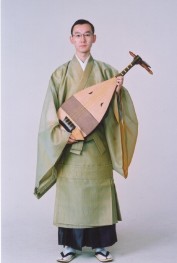|
"Lute lore": the translation of terms for musical instruments Topic raised by: David Pollack Discussants: Thread also known as: " Chinese and Japanese Lute Lore," "Let's say zither, not lute ...," "see ya, 'biwa'; don't boot 'lute'!"etc. Date: Fri, 22 Oct 2004 13:20:47 -0400 Date: Tue, 9 Nov 2004 13:51:49 +0900 From: Steven G. Nelson Subject: [pmjs] Let's say zither, not lute ... Just a short note from a musicologist who cares about these things. Van Gulik's pioneering work on the qin/kin used the translation lute, but there are a number of reasons why this is no longer suitable, the main one being that there is a very different family of instruments in East Asia (pipa/biwa) which can only be called lutes in terms of their construction. The standard translation for qin/kin is zither. Of course, one may debate the necessity of having a standard translation, but I'm pretty confident that the merits outweigh the demerits in this case. Steven Nelson Date: Tue, 9 Nov 2004 06:37:27 EST Date: Tue, 09 Nov 2004 11:16:14 -0600 From: Anthony J. Bryant Subject: [pmjs] Re: lute lore Ingrid Parker wrote: And Steven Nelson's remarks on the proper translation of biwa (lute) and koto (zither) were also very welcome. I have used these terms for years after looking at pictures of both instruments and reading descriptions of their use in Japan. I have to admit a frustration here. Nothing to do with you, it's just that you reminded me of it. A biwa is NOT a lute. Why do we call it lute? Well, lutes are a bit more exotic, but one might as well call it a guitar and with little difference. A biwa is a biwa. A sho is a sho. A shamisen is a shamisen. I don't mind a footnote or explanation where necessary, but I bristle at such things. I've seen references to Heian nobles playing chess. Say what? Chess? How cool. Knights and pawns and rooks. No, dammit, they were playing shogi. Possibly. They may have been playing go, actually, but the overenthusiastic translator may have just substituted "chess". Chess is not a "generic" board game. It is a specific game. Am I the only one frustrated by these things? (Or should I just dial back the morning coffee quotient?) Tony -- Anthony J. Bryant Website: http://www.sengokudaimyo.com Date: Wed, 10 Nov 2004 09:53:39 -0700 From: Larry V. Shumway Subject: [pmjs] Re: lute lore Hi Tony: Just dial back on the coffee. The biwa is a lute. Lute is the generic designation of any string instrument with a neck, which a biwa has. This applies to the shamisen as well as numerous traditional instruments found in almost all countries. Thus the biwa would be described in generic terms as a short-necked, pear shaped plucked lute, with frets, played with a large plectrum. Since words are obviously inadequate for further description a picture would be necessary to fill in the rest. Cheers, Larry V. Shumway Date: Wed, 10 Nov 2004 16:16:31 -0500 From: Mike Smitka Subject: [pmjs] lute lore Since I deal mainly with undergrads, I am torn both ways. A musicologist need not be told that whatever a "biwa" is, it is not going to be the same as a European lute. But for the truly unsophisticated, it adds a point of reference. Yes, then we have to fight the misperception, and sometimes consciously using an ambiguous word can help sensitize students to the need for caution -- distint times and cultures invite misinterpretation. Does calling a shamisen a "banjo" help? Well, the timbre and the use of a pick are common, and even some of the playing style, plus there are analogs in many other musical cultures. So if I'm speaking to someone totally naive of things Japanese, that might be helpful... It's a combination of audience and one's own prose style, whether you're trying to keep "strange" words to a minimum, as distractions from the story. For the same reason, I find macrons overdone. If I see a name, I typically know what it really is; macrons convey little additional information, and are ugly. If I didn't know Japanese, they wouldn't help at all, they'd just confuse. Either way, best to dispense.... Date: Thu, 11 Nov 2004 21:24:31 +0900 From: Steven G. Nelson Subject: [pmjs] A semi-apology Well, I'm sorry for apparently having opened a can of worms on the subject of what to call the pipa/biwa. Larry's answer on the biwa being a lute in terms of modern organology (the study of music instruments), in which string instruments are divided into five classes depending on their construction, was expressed much more elegantly than my initial call for a certain standardization in terminology. I am also much indebted to Van Gulik's work, for which I have the greatest respect. But I cannot help wishing that he hadn't called the qin/kin a lute. If you are bothered by the standardization of terminology, then you must of course be bothered by Chancellor and Regent and all of those other terms that even the best of the translators use. So, what to do? Leave everything in the original language? And I cannot agree on macrons (or some indications of double vowels, or whatever you want to call them) being unnecessary. If you find them ugly, what about German or French or any of those other languages that use signs other than those of the alphabet? Isn't it just a question of what you are used to, and what may be helpful for each of us as we try to understand each other's languages? Since it indicates vowel length precisely, I myself prefer the doubling of the vowel (as in Tookyoo), but I know that I am in a small minority there, so please don't feel obliged to remind me. This has become less of an apology than I had intended, so I will leave it there. Regards, Steven Nelson Date: Thu, 11 Nov 2004 09:18:16 CST From: ML Nagata Subject: [pmjs] Re: lute lore Let me add to that. The people who make and repair violins, violas, cellos, etc. instruments of this type are also called luthiers, likely for the same reason. ML Nagata On 10 Nov 2004, Larry V. Shumway wrote: > Hi Tony: > Just dial back on the coffee. The biwa is a lute. Lute is the generic > designation of any string instrument with a neck, which a biwa has. > This applies to the shamisen as well as numerous traditional instruments > found in almost all countries. <...> Date: Thu, 11 Nov 2004 09:40:48 -0500 From: David Pollack Subject: Re: [pmjs] lute lore i have to agree about finding a familiar term to get the general idea across, though of course we don't want to have confucius playing the clavichord (as keene has pointed out, or was it waley). a picture and recording always trump any number of words. and even the word "lute" does not mean one thing, since over time it has been used to refer to many things, with its origins in the arabic oud (al'oud, like al'jebr, al'kimiya and other such terms). it first shows up in painting with four strings and plucked with a quill, and later with five, six, seven, eight, nine, ten courses (not strings) and plucked with fingers (tips? nails? major ethnomusicological argument here). just as viols and recorders (and shawms, sackbutts and cornettos) came in a variety of sizes, the "chest of lutes" ranged from soprano to basso. there were a wide variety of tunings. and a lute was distinct from a bandora, chittarone, guitar, and even theorbo or archlute, which had as many as fourteen courses and stood as tall as today's double-bass.
david pollack Date: Thu, 11 Nov 2004 10:30:33 -0800 From: Morgan Pitelka Subject: [pmjs] PMJS: see ya, "biwa"; don't boot "lute"! Dear Anthony and colleagues, The coffee quotient is high here as well. I, for one, get frustrated for the opposite reason. Refusing to translate Japanese terms into English when we are writing for an English-language readership is, I think, a form of intellectual cowardice. We should be willing to take a stand on the meaning of terms, however fluid, fragmentary, and contingent, or we risk objectifying and exoticizing our subject matter and marginalizing our work. We write, after all, for an English-language readership, not a Japanese one. Of course there are exceptions. Sometimes a specialized Japanese term must be foregrounded to allow philological or linguistic analysis. Perhaps the term became a proper noun or was used in a complicated pun. Likewise, in some cases we are writing for a narrow audience of specialists. In a journal like Monumenta Nipponica, for example, which is avowedly aimed at Japanologists, it makes complete sense to employ Japanese terminology without hesitation because the expectation is that all readers will either know the term or know how to discover its meaning. In books and articles published for a broader readership, however, what is the point of insistently employing an eminently translatable word like "chado" instead of the translation "way of tea"? "Utsushi" instead of "reproduction"? Or "katana" instead of "long sword"? Perhaps you would object that all those terms can be interpreted in different ways, and that the English-language translations loose the nuanced texture of the Japanese original. Maybe you think that we should use the Japanese terms to distinguish between "chado" and "chanoyu," and between "katana" and "tachi." I would respond that all scholarship is interpretation. We are constantly making choices of this sort when we research and write, not only in Japanese but in English as well. The play of meaning, the possibility of new interpretations and misinterpretations - these are precisely what make scholarship interesting. If we want our work to matter to anyone other than Japanophiles and Japanologists, we must operate in the rubric of English-language scholarship, which means making these hard choices. Most frustrating of all, to me, are those books and articles that DO take an intellectual stand by providing an English-language translation of a difficult or esoteric Japanese term, but then continue to use the Japanese term. A few pages or chapters later, most non-specialist readers have forgotten the term and feel lost. This approach succeeds only in alienating readers and in creating the false impression that the author knows Very Important Things. Things that are obviously too important to bother translating into English. Morgan ***************** Morgan Pitelka Asian Studies Department 408 Johnson Hall Occidental College 1600 Campus Road Los Angeles, CA 90041 ***************** |
||||||||||||||||||||||||||||||||


